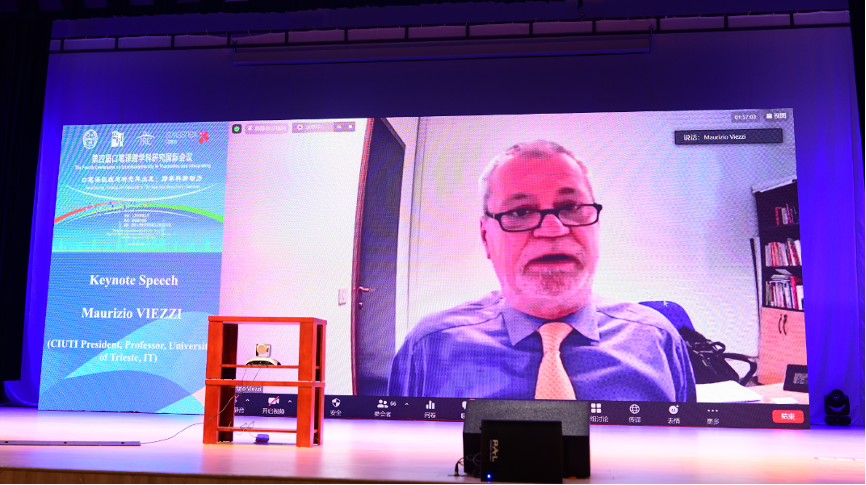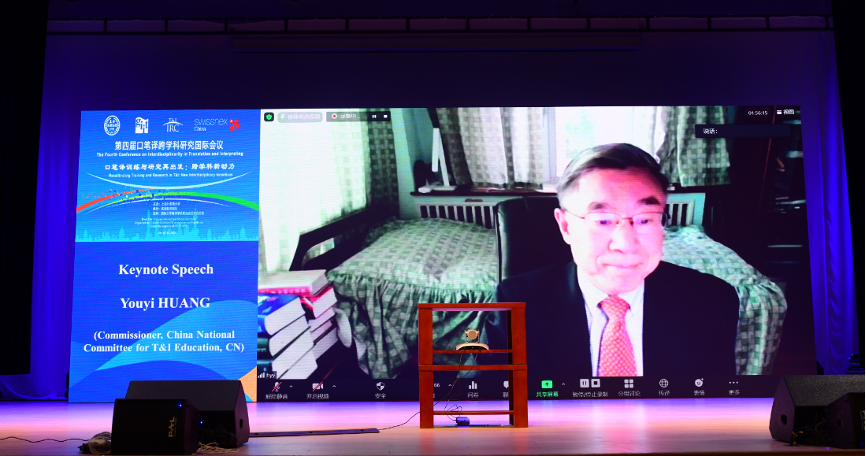
With the theme “Recalibrating Training and Research in T&I: New Interdisciplinary Incentives”, the conference gathered prominent professionals and experts from both academia and industry to share their latest insights in T&I. The organizer finds it pertinent to use intercultural and interdisciplinary perspectives to forge new pathways and collaborations between different disciplines in finding solutions and strategies to tackle both old and new challenges.
Irene Zhang, Dean of GIIT, SISU, opened the 4th interdisciplinary conference by welcoming all online participants. She introduced the 4 sub-themes of the conference, including “Role of Language Services in Global Governance”, “Multilingualism in Multilateral Systems: Interdisciplinary & Intercultural Issues”, “How T&I Supports Science in Coping with PHEIC?” and “New and Fresh Approaches in T&I”.

At the opening ceremony, Maurizio Viezzi, CIUTI President and Professor of Simultaneous and Consecutive Interpreting at the University of Trieste, pointed out that despite the growing momentum of AI translation, a huge gap still exists between the supply of and demand for qualified translators and interpreters in public service, and high-level interpreters and translators are indispensable in that they facilitate cultural communication and assist in education, medical care, and legal service, etc.

Youyi Huang, Commissioner for China National Committee for Translation and Interpreting Education, made clear with specific examples that COVID-19 pandemic has exposed the deficiency of machine translation and underscored the important role of translators in the global fight against the pandemic. Translators around the world have assisted in medical supplies distribution, airport security screening, official announcement dissemination and medical treatment experience exchanges. The call for translator initiative in combating pandemic has shown that the interdisciplinary development of translation studies is of great significance in T&I education. He also demonstrated the necessity of cultivating cross-cultural and multi-disciplinary talent and advancing the cross-disciplinary development as the way forward.

President Yansong Li, speaking on behalf of the SISU leadership, welcomed all participants, shared information on what the university has been doing including fighting the pandemic, and pledged support for international collaboration.
During the four sessions of the conference, professionals and experts with various knowledge background and rich hands-on experience shared their insights on interdisciplinary research in T&I. The discussions covered a broad range of topics, including global governance, economics, sociology of law, medicine, technology and their interactions with T&I research and practice.
At the closing ceremony, Hannelore Lee-Jahnke, Chair of IRC, spoke highly of the efforts made by all speakers across the globe in making this conference a big success. She also announced the launch of Journal of Translation Studies, as a joint effort by GIIT in collaboration with Perter Lang, a renowned Swiss academic publishing institution. She hopes the journal will provide a new platform for industry and academia to exchange insights and discoveries in T&I research and training.

The conference gathered all five CIUTI members in China – Beijing Foreign Studies University, Beijing Language and Culture University, Beijing International Studies University, Guangdong University of Foreign Studies and Shanghai International Studies University, with representative speakers from each of these institutions.
Speakers from over 20 countries in different time zones across the globe made presentations at the conference. GIIT faculty members who’re active interpreters themselves provided remote simultaneous interpretation (RSI) in three language pairs (EN-ZH, ES-ZH, FR-ZH). Bilibili, a Chinese web-streaming platform was also used to broadcast the conference real time. More than 5,000 views tuned in to watch the opening of the conference.

